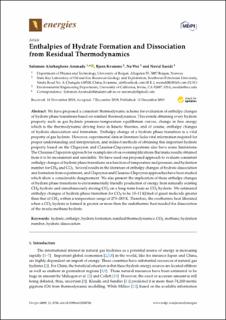| dc.contributor.author | Aromada, Solomon Aforkoghene | |
| dc.contributor.author | Kvamme, Bjørn | |
| dc.contributor.author | Wei, Na | |
| dc.contributor.author | Saeidi, Navid | |
| dc.date.accessioned | 2021-01-29T12:50:19Z | |
| dc.date.available | 2021-01-29T12:50:19Z | |
| dc.date.created | 2020-02-13T19:25:04Z | |
| dc.date.issued | 2019-12-11 | |
| dc.Published | Energies. 2019, 12 (24), 4726. | en_US |
| dc.identifier.issn | 1996-1073 | |
| dc.identifier.uri | https://hdl.handle.net/11250/2725358 | |
| dc.description.abstract | We have proposed a consistent thermodynamic scheme for evaluation of enthalpy changes of hydrate phase transitions based on residual thermodynamics. This entails obtaining every hydrate property such as gas hydrate pressure-temperature equilibrium curves, change in free energy which is the thermodynamic driving force in kinetic theories, and of course, enthalpy changes of hydrate dissociation and formation. Enthalpy change of a hydrate phase transition is a vital property of gas hydrate. However, experimental data in literature lacks vital information required for proper understanding and interpretation, and indirect methods of obtaining this important hydrate property based on the Clapeyron and Clausius-Clapeyron equations also have some limitations. The Clausius-Clapeyron approach for example involves oversimplifications that make results obtained from it to be inconsistent and unreliable. We have used our proposed approach to evaluate consistent enthalpy changes of hydrate phase transitions as a function of temperature and pressure, and hydration number for CH4 and CO2. Several results in the literature of enthalpy changes of hydrate dissociation and formation from experiment, and Clapeyron and Clausius-Clapeyron approaches have been studied which show a considerable disagreement. We also present the implication of these enthalpy changes of hydrate phase transitions to environmentally friendly production of energy from naturally existing CH4 hydrate and simultaneously storing CO2 on a long-term basis as CO2 hydrate. We estimated enthalpy changes of hydrate phase transition for CO2 to be 10–11 kJ/mol of guest molecule greater than that of CH4 within a temperature range of 273–280 K. Therefore, the exothermic heat liberated when a CO2 hydrate is formed is greater or more than the endothermic heat needed for dissociation of the in-situ methane hydrate. | en_US |
| dc.language.iso | eng | en_US |
| dc.publisher | MDPI | en_US |
| dc.rights | Navngivelse 4.0 Internasjonal | * |
| dc.rights.uri | http://creativecommons.org/licenses/by/4.0/deed.no | * |
| dc.title | Enthalpies of Hydrate Formation and Dissociation from Residual Thermodynamics | en_US |
| dc.type | Journal article | en_US |
| dc.type | Peer reviewed | en_US |
| dc.description.version | publishedVersion | en_US |
| dc.rights.holder | Copyright 2019 by the authors. | en_US |
| dc.source.articlenumber | 4726 | en_US |
| cristin.ispublished | true | |
| cristin.fulltext | original | |
| cristin.qualitycode | 1 | |
| dc.identifier.doi | 10.3390/en12244726 | |
| dc.identifier.cristin | 1794032 | |
| dc.source.journal | Energies | en_US |
| dc.source.40 | 12 | en_US |
| dc.source.14 | 24 | en_US |
| dc.identifier.citation | Energies. 2019, 12 (24), 4726. | |

